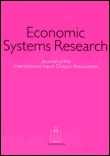
Economic Systems Research
Scope & Guideline
Exploring the Dynamics of Economic Systems
Introduction
Aims and Scopes
- Input-Output Analysis:
The journal extensively utilizes input-output models to study economic interactions between sectors and regions, facilitating a deeper understanding of production, consumption, and trade dynamics. - Computable General Equilibrium (CGE) Modeling:
CGE models are employed to simulate the economy-wide effects of policy changes, environmental impacts, and other economic shocks, providing insights into the broader implications of economic decisions. - Sustainability and Environmental Economics:
Research often focuses on the economic implications of sustainability initiatives, such as carbon taxes and energy transitions, highlighting the intersection of environmental and economic policies. - Regional Economic Impacts:
The journal explores regional disparities and the localized effects of economic policies, using case studies to illustrate how different regions respond to global economic changes. - Technological and Structural Change:
Studies often analyze how technological advancements and structural changes within economies impact productivity, labor markets, and economic resilience.
Trending and Emerging
- Climate Change and Economic Resilience:
Recent publications increasingly focus on the economic impacts of climate change and strategies to enhance resilience, reflecting a growing concern for sustainability and adaptive economic policies. - Digital Economy and Taxation:
The rise of the digital economy has prompted research on its macroeconomic implications, particularly regarding taxation strategies, as seen in studies on digital service taxes and their economic impacts. - Interconnectedness of Global Value Chains:
Emerging themes explore the complexities of global value chains, particularly in the context of disruptions caused by events such as the COVID-19 pandemic, highlighting the need for integrated analysis. - Inequality and Economic Distribution:
There is an increasing emphasis on understanding the distributional impacts of economic policies and structural changes, particularly regarding income inequality and its economic consequences. - Big Data and Economic Modeling:
The integration of big data analytics into economic modeling is gaining traction, with studies focusing on how data-driven approaches can improve the accuracy and relevance of economic predictions.
Declining or Waning
- Traditional Trade Models:
Research utilizing classical trade models, such as the Ricardian model, has diminished as newer methodologies like input-output and CGE models gain prominence for their ability to incorporate more complex interactions. - Basic Economic Growth Theories:
There has been a noticeable decline in papers focused solely on traditional economic growth theories without integrating contemporary issues such as sustainability, inequality, and technological change. - Static Economic Analysis:
Static analyses that do not incorporate dynamic elements or temporal changes are becoming less common, as researchers increasingly recognize the importance of understanding economic systems over time. - Localized Economic Studies:
While regional studies remain relevant, there is a waning interest in purely localized economic analyses that do not connect to broader global or technological trends. - Descriptive Economic Assessments:
Papers that primarily provide descriptive statistics or assessments without rigorous modeling or theoretical frameworks are less frequently published, reflecting a trend towards more analytical and methodologically robust research.
Similar Journals
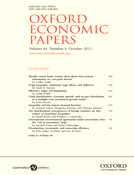
OXFORD ECONOMIC PAPERS-NEW SERIES
Unveiling insights that shape global economic discourse.OXFORD ECONOMIC PAPERS-NEW SERIES is a prestigious academic journal published by Oxford University Press, dedicated to advancing the field of economics and econometrics. With an ISSN of 0030-7653 and an E-ISSN of 1464-3812, this journal has a rich history since its inception in 1938, and continues to play a vital role in disseminating impactful research through its convergence of years spanning from 1938 to 2024. Recognized as a Q2 journal in the 2023 category of Economics and Econometrics, it ranks #396 among 716 in its field according to Scopus, reflecting a commendable position within the academic community, particularly in global economic discussions. While the journal currently does not offer open access options, it remains committed to providing a platform for rigorous research and critical discourse. Researchers, professionals, and students will find the journal's articles to be essential reading, offering insights that are pivotal for understanding economic trends, policies, and methodologies. Its focus on high-quality scholarship ensures that contributions are both theoretically robust and practically relevant, making it a significant resource in the ever-evolving landscape of economic research.

Eurasian Economic Review
Innovative research for a changing economic landscape.Eurasian Economic Review is a premier academic journal dedicated to the dissemination of high-quality research in the field of economics, notably within the Eurasian context. Published by SPRINGER HEIDELBERG in Switzerland, this journal stands out with an impressive Q2 ranking in the 2023 category of Economics, Econometrics and Finance, reflecting its influential role in fostering scholarly dialogue. The journal encompasses a broad array of topics related to economic trends, policy impacts, and theoretical advancements, making it an essential resource for researchers, professionals, and students alike. With a consistent output since its inception in 2011, the Eurasian Economic Review is committed to providing open access to its valuable content, ensuring that important findings are widely available to the global research community. As a member of the top 9th percentile in Scopus rankings for its field, this journal uniquely positions itself as a vital conduit for innovative and impactful research in economics.

Prague Economic Papers
Bridging Theory and Practice in Economic StudiesPrague Economic Papers is an esteemed scholarly journal dedicated to the fields of Economics, Finance, and Econometrics, published by UNIV ECONOMICS-PRAGUE. With its ISSN 1210-0455 and E-ISSN 2336-730X, this journal serves as a vital platform for innovative economic research and theoretical advancement. Operating from the scenic backdrop of the Czech Republic, Prague Economic Papers is recognized in Scopus with rankings that place it in quartile Q4 for Economics and Econometrics, as well as Q3 for Finance, reflecting its growing impact in the academic sphere. Though the journal does not currently offer open access, it ambitiously covers a wide expanse of economic theories and empirical studies, contributing significantly to the evolution of economic thought from 2008 to 2024. Researchers, professionals, and students alike will find this journal essential for accessing critical insights and methodologies that shape contemporary economic discourse.
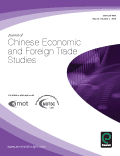
Journal of Chinese Economic and Foreign Trade Studies
Deciphering the Economic Tapestry of ChinaJournal of Chinese Economic and Foreign Trade Studies is a distinguished academic platform dedicated to exploring the intricate dynamics of China’s economic policies and foreign trade practices. Published by Emerald Group Publishing Ltd, this journal caters to a diverse readership interested in the intersection of business, economics, and international management. With an ISSN of 1754-4408 and an E-ISSN of 1754-4416, it demonstrates its influence in the scholarly community, evidenced by its latest categorization as a Q3 journal in Business and International Management and Q2 in Economics, Econometrics, and Finance for 2023. The journal’s rank of #67/288 in the Scopus database places it in the 76th percentile, affirming its significance in the field. Although it operates under traditional access models, the journal invites rigorous academic discourse and provides a vital source of knowledge for scholars interested in the evolving landscape of Chinese trade and economic strategies from 2010 to 2024.
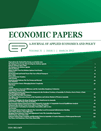
Economic Papers
Advancing Economic Insight, One Paper at a Time.Economic Papers is a prestigious journal published by WILEY, recognized for its contributions to the fields of economics, econometrics, and finance since its inception in 1982. With an impressive impact factor reflecting its scholarly influence, this journal is ranked in the Q2 category in the Economics, Econometrics, and Finance sector, placing it among the top 30% of journals in the field. The journal aims to disseminate high-quality research that addresses contemporary economic challenges, thereby advancing both theoretical understanding and practical applications. While currently not available as open access, Economic Papers provides vital insights for researchers, professionals, and students striving to deepen their comprehension of economic dynamics and contribute to sound policy-making. Scholars are encouraged to submit their work to engage with a robust academic community and impact the discourse in economic research.

PSL Quarterly Review
Connecting Scholars with Practical InsightsPSL Quarterly Review, published by ASSOC PAOLO SYLOS LABINI, is a distinguished open-access journal based in Italy, dedicated to fostering discourse in multifaceted fields such as Business, Management, and Accounting, as well as Economics and Law. Since its inception in 2009, the journal has carved a niche in academia, providing a platform for innovative research and critical thought. With an impactful presence reflected in its 2023 Scopus ranks, including Q3 classifications in Business, Management, Accounting, and Economics, alongside a Q2 classification in Law, the PSL Quarterly Review serves as a vital resource for scholars and practitioners alike. The journal aims to bridge the gap between theoretical frameworks and practical applications, thus enriching the repertoire of contemporary economic and legal studies. Its broad accessibility and commitment to quality scholarship ensure that it remains a pivotal publication for those engaged in advancing knowledge across relevant disciplines.
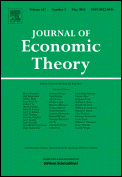
JOURNAL OF ECONOMIC THEORY
Shaping Tomorrow’s Economic Theories TodayThe JOURNAL OF ECONOMIC THEORY, published by Academic Press Inc Elsevier Science, stands as a paramount platform for disseminating groundbreaking research within the field of economics and econometrics. With an impressive history dating back to 1969 and a convergence period extending to 2024, this journal has continually shaped the academic discourse around critical economic theories and methodologies. Currently recognized in the top quartile (Q1) of its category for 2023, it ranks prominently among its peers, boasting an impactful scholarly contribution reflected in its Scopus ranking—positioned at #348 out of 716 journals in the domain. Although it does not offer Open Access, the journal provides an essential resource for those seeking to enhance their understanding of complex economic models and strategies. Researchers, professionals, and students alike will find the JOURNAL OF ECONOMIC THEORY to be an invaluable asset for their academic and professional pursuits in the rapidly evolving landscape of economics.

CHINA ECONOMIC REVIEW
Exploring the Dynamics of China’s Economic LandscapeChina Economic Review, published by Elsevier Science Inc, stands as a leading academic journal dedicated to the rigorous exploration of economic and financial issues pertinent to China and its place in the global economy. Established in 1989, this journal has built a robust reputation over the years, achieving a prestigious Q1 ranking in both Economics and Econometrics and Finance as of 2023. With a Scopus rank placing it in the top 93rd percentile for both categories, the journal serves as a vital resource for researchers, policymakers, and students alike, facilitating a deeper understanding of China’s economic dynamics. Although not an Open Access publication, articles are rigorously peer-reviewed, ensuring high-quality contributions that advance the field. With the scope covering a diverse range of topics, from market trends to fiscal policies, China Economic Review remains essential for those looking to engage with cutting-edge research and insights into one of the world's largest economies.
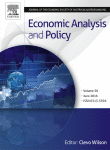
Economic Analysis and Policy
Driving Innovation in Economic Analysis and Policy SolutionsEconomic Analysis and Policy is an esteemed academic journal published by ELSEVIER, dedicated to advancing the field of economics and econometrics since its inception in 1970. Based in the Netherlands, this journal plays a pivotal role in disseminating high-quality research that addresses contemporary economic issues and policy challenges. With an impressive Q1 ranking in both the Economics and Econometrics categories, and recognition in the top 91st percentile of Scopus rankings, it is a leading platform for scholars, professionals, and students seeking to contribute to and engage with the evolution of economic thought. The journal does not currently operate on an open access model, allowing it to maintain rigorous peer-review standards that ensure the integrity and impact of published research. As a vital resource for anyone interested in the intersection of theory and policy in economics, Economic Analysis and Policy fosters a community committed to rigorous analysis and innovative solutions in the economic domain.
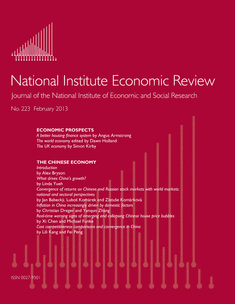
National Institute Economic Review
Leading the way in innovative economic research since 1960.National Institute Economic Review, published by CAMBRIDGE UNIVERSITY PRESS, stands as a pivotal academic journal within the realms of Economics, Econometrics, and Finance. Since its inception in 1960, this journal has continually provided insightful research and analyses that address pressing economic issues, making significant contributions to both theoretical and applied economics. With a notable Q1 category ranking in the 2023 Scimago Journal Rank, it is recognized as a leading publication in its field, currently ranked #62 out of 288 in Scopus. The journal aspires to foster a deeper understanding of complex economic phenomena, offering a platform for both established and emerging scholars. While it operates under a traditional access model, the integrity and rigor of the content ensure its relevance and utility for researchers, professionals, and students alike. The interdisciplinary approach taken in the articles published not only enhances the comprehension of economic policies but also encourages dialogue among diverse economic theorists and practitioners worldwide.